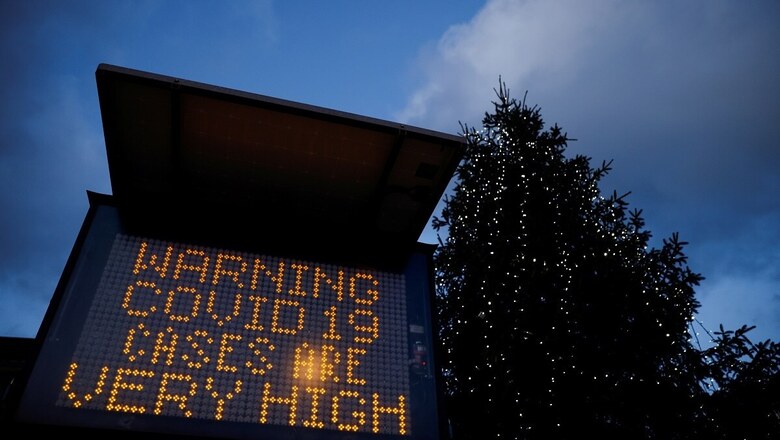
views
London: A large number of people remain infected with the coronavirus in England and the rate of new infections was not dropping even 10 days into the latest stay-at-home lockdown, an ongoing government-backed study said on Thursday. The Imperial College London and Ipsos MORI Real-time Assessment of Community Transmission (REACT) study into the country’s COVID-19 infections, show that infections increased by 50 per cent from early December 2020, with 1 in 63 people infected. Based on swab tests on over 142,900 volunteers in the community between January 6 and 15, the study has also picked up early signs that infections may have begun to rise at the national level. The analysis, however, does not fully reflect the impact of the latest tough lockdown which came into force from January 5.
British Prime Minister Boris Johnson said the figures showed the new variant of coronavirus was “much more contagious and urged people to strictly follow the lockdown restrictions. “I think it’s too early to say when we’ll be able to lift some of the restrictions In the REACT survey, we’re seeing the contagiousness of the new variant that we saw arrive just before Christmas there’s no doubt it does spread very fast indeed. It’s not more deadly but it is much more contagious and the numbers are very great,” he said, during a visit to Didsbury in Manchester.
The REACT study found that prevalence of the virus was highest in London, with 1 in 36 people infected more than double compared to the previous REACT report in early December 2020. Infections had also more than doubled in the south east, east of England and West Midlands “Our data are showing worrying suggestions of a recent uptick in infections which we will continue to monitor closely. To prevent our already stretched health system from becoming overwhelmed infections must be brought down; if prevalence continues at the high rate we are seeing then hospitals will continue to be put under immense pressure, and more and more lives will be lost, warned Professor Paul Elliott, director of the programme at Imperial College London. “Infections across England are at very high levels and this will have a knock-on effect on the already significant pressures faced by our NHS (National Health Service) and hospitals. It is absolutely paramount that everyone plays their part to bring down infections,” said UK Health Secretary Matt Hancock.
“This means staying at home and only going out where absolutely necessary, reducing contact with others and maintaining social distancing,” he said. The latest findings come as the UK hit another high daily coronavirus death toll figure of 1,820, with the government working on expanding its vaccination drive.
The NHS said a mosque in Birmingham and an Odeon cinema in Aylesbury are among dozens of new sites that have started to offer the service, adding to the thousands of hospitals, general practice (GP) and pharmacy sites in operation to administer the Pfizer/BioNTech and Oxford/AstraZeneca jabs to the highest priority groups. “This virus is a lethal threat to us all and as we respond through this huge endeavour let’s all take comfort in the fact we’re giving 200 vaccinations every minute,” Hancock told the House of Commons.
“Each week the NHS is making it easier for people to get a jab closer to home, in places at the heart of their community from the local pharmacy to the local mosque,” added Nadhim Zahawi, UK Minister for Vaccine Deployment. The initial priority groups of those aged 80 and care home residents and staff has been expanded to people 70 and over and the clinically vulnerable, besides frontline NHS workers. Those in the eligible categories are being invited to arrange an appointment at a pharmacy service or vaccination centre through the NHS national booking service.
England’s Deputy Chief Medical Officer, Professor Jonathan Van-Tam, used his 79-year-old mother’s vaccination as a means of pushing out the message of vaccine safety. “Vaccines are the way out of this pandemic and I urge everyone to take up the offer as soon as they are called forward,” he said.
The UK government is working in parallel to counter disinformation around COVID-19 vaccines, especially within ethnic minority communities who have shown some reluctance in its uptake.
Read all the Latest News, Breaking News and Coronavirus News here



















Comments
0 comment